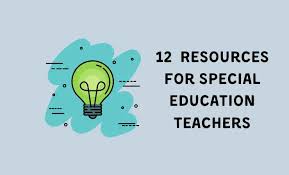
Special Education Resources: Empowering Every Student
Special education resources play a crucial role in ensuring that every student has access to quality education and support tailored to their individual needs. These resources encompass a wide range of tools, programs, and services designed to help students with disabilities or special learning requirements succeed academically and socially.
One key aspect of special education resources is assistive technology, which includes devices and software that assist students in completing tasks, communicating effectively, and accessing educational materials. Assistive technology can range from simple tools like text-to-speech software to more complex devices such as communication boards or specialized computer programs.
Another important component of special education resources is specialized instruction provided by trained professionals. This may include individualized lesson plans, small group instruction, or one-on-one tutoring to address specific learning challenges and help students reach their full potential.
Additionally, special education resources often involve collaboration with parents, teachers, therapists, and other professionals to create a supportive network around the student. This team approach ensures that the student receives comprehensive care and support across all areas of their life.
By providing access to these valuable resources, schools can empower every student to thrive academically and socially, regardless of their unique learning needs. Special education resources play a vital role in creating an inclusive educational environment where every student has the opportunity to succeed.
Overall, special education resources are essential tools for promoting equity and inclusivity in education. By investing in these resources and supporting students with diverse needs, we can create a more accessible and supportive educational system that benefits all learners.
6 Essential Tips for Accessing Special Education Resources
- 1. Utilize Individualized Education Programs (IEPs) to tailor educational plans for students with special needs.
- 2. Explore assistive technology tools and resources to support learning and communication.
- 3. Stay informed about local and federal laws regarding special education rights and services.
- 4. Collaborate with teachers, therapists, and other professionals to create a comprehensive support system.
- 5. Attend workshops, seminars, and training sessions to enhance your knowledge of special education practices.
- 6. Connect with parent support groups or online communities for valuable insights and guidance.
1. Utilize Individualized Education Programs (IEPs) to tailor educational plans for students with special needs.
Utilizing Individualized Education Programs (IEPs) is a crucial tip when it comes to special education resources. IEPs allow educators to tailor educational plans specifically to meet the unique needs of students with special requirements. By creating personalized goals, accommodations, and support services outlined in an IEP, students can receive the individualized attention and resources necessary to help them succeed academically and reach their full potential. IEPs serve as a roadmap for educators, parents, and support staff to collaborate effectively in providing comprehensive and targeted support for students with special needs.
2. Explore assistive technology tools and resources to support learning and communication.
Exploring assistive technology tools and resources is a valuable tip for enhancing learning and communication support in special education. These tools, ranging from software programs to specialized devices, can empower students with disabilities to overcome barriers and access educational materials effectively. By incorporating assistive technology into the learning environment, educators can create more inclusive and personalized learning experiences that cater to the diverse needs of students. This proactive approach not only enhances academic success but also fosters independence and confidence in students as they navigate their educational journey.
3. Stay informed about local and federal laws regarding special education rights and services.
It is crucial to stay informed about local and federal laws regarding special education rights and services. Understanding the legal framework surrounding special education ensures that students with disabilities receive the support and accommodations they are entitled to. By staying up-to-date on these laws, parents, educators, and advocates can advocate effectively for students and ensure that they have access to the resources they need to succeed in school and beyond.
4. Collaborate with teachers, therapists, and other professionals to create a comprehensive support system.
Collaborating with teachers, therapists, and other professionals is a crucial step in creating a comprehensive support system for students with special education needs. By working together as a team, these professionals can share insights, strategies, and resources to provide holistic support that addresses the diverse needs of each student. This collaborative approach ensures that students receive coordinated care across all aspects of their education and development, leading to improved outcomes and a more inclusive learning environment.
5. Attend workshops, seminars, and training sessions to enhance your knowledge of special education practices.
Attending workshops, seminars, and training sessions is a valuable tip for enhancing knowledge of special education practices. These events provide opportunities to learn about the latest research, strategies, and techniques in the field of special education. By participating in these professional development opportunities, educators can gain new insights, exchange ideas with colleagues, and stay updated on best practices for supporting students with diverse learning needs. Continuous learning through workshops and training sessions empowers educators to better serve their students and create a more inclusive and supportive learning environment.
6. Connect with parent support groups or online communities for valuable insights and guidance.
Connecting with parent support groups or online communities can provide valuable insights and guidance when seeking special education resources for your child. These groups offer a platform for parents to share experiences, exchange information, and offer support to one another. By tapping into these networks, you can gain access to firsthand knowledge, recommendations, and strategies that can help navigate the complexities of special education and advocate effectively for your child’s needs. Building connections within these communities can be a powerful resource in ensuring that your child receives the support and resources they require to thrive in their educational journey.
